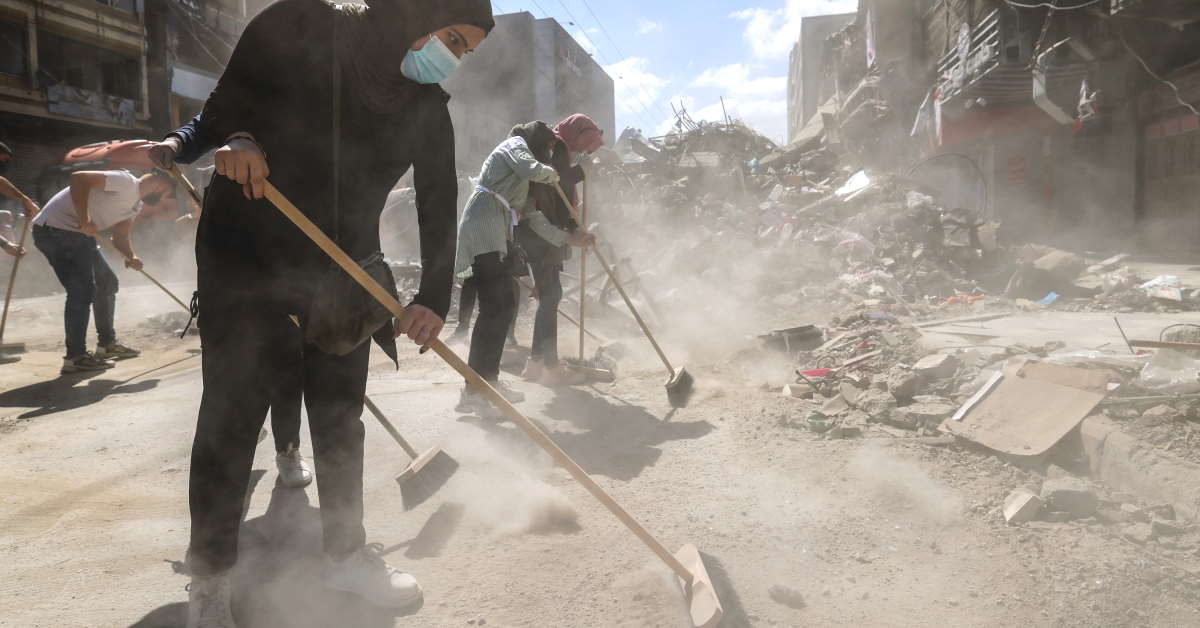Gazans tried to piece back their lives Saturday after a devastating 11-day conflict with Israel that killed more than 200 people and made thousands homeless in the impoverished Palestinian enclave.
Authorities started distributing tents and mattresses in the Gaza Strip, a day after an Egypt-brokered ceasefire ended deadly Israeli air strikes on the besieged enclave and rocket fire out of it towards Israel.
Attention turned to rebuilding the coastal territory controlled by the Islamist group Hamas as rescue workers searched for bodies or survivors in mounds of rubble, while residents tried to assess what was left of their lives.
The latest round of bombardment killed 248 people in Gaza, including 66 children, and wounded over 1,900 since 10 May, the Hamas-run health ministry says.
The United Nations (UN) says more than half of those killed, the overwhelming majority in Israeli air strikes, were civilians.
Israel claims it has killed "more than 200 terrorists", including 25 commanders.
Rockets fired by Palestinian armed groups killed 12 people in Israel including a child, an Israeli soldier, an Indian citizen and two Thai nationals, the police say, and wounded around 357 people.
Thousands Homeless
In front of a flattened tower block where she used to rent out apartments, Aisha Mousallem was wearing black.
"Even if I lost no one in my family, I'm in mourning," she said.
Sarah Muscroft, the head of the UN Office for the Coordination of Humanitarian Affairs (OCHA) in the occupied Palestinian territories, said the intensity of the bombardment had led to "extensive damage" across Gaza.
"Over 6,000 people have been rendered homeless as a result of the hostilities," she said.
More than 1,042 housing or commercial units were estimated to have been completely destroyed, and 800,000 people have no regular access to water.
"The building effort is going to be really quite profound," she said.
Earlier on Saturday, shopkeepers assessed the damage, finding many supplies coated in thick layers of dust.
Wael Amin al-Sharafa said he had stocked up his shop with new clothes to sell during the usually busy period of Eid al-Fitr, at the end of the Muslim holy fasting month of Ramadan.
"But now it's all lost," he said. "Who will pay for all this? I have no idea."
'Two-State Solution'
Convoys of lorries bringing much-needed medicine, food and fuel entered Gaza Friday through the Kerem Shalom crossing after Israel reopened it.
The UN's Central Emergency Response Fund said it had released US$18.5 million for humanitarian efforts.
The latest round of Israeli bombardment forced 91,000 people to flee their homes in Gaza, according to OCHA.
An Egyptian security delegation monitoring the ceasefire deal met Palestinian president Mahmud Abbas on Saturday, Palestinian news agency WAFA said.
Both Israel and Hamas were fast to claim victory.
Prime Minister Benjamin Netanyahu said Israel's bombing campaign had been an "exceptional success".
Hamas' political chief Ismail Haniyeh said the group had "dealt a painful and severe blow that will leave its deep marks" on Israel, and thanked Iran for "providing funds and weapons".
An AFP photographer on Saturday saw fighters of Hamas' armed wing parading in the streets of Gaza city.
The Hamas authorities said government offices would re-open on Sunday.
The international community welcomed the ceasefire and the UN Security Council on Saturday called for "full adherence" to it.
United States (US) President Joe Biden on Friday pledged to help organise efforts to rebuild Gaza and said creating a Palestinian state alongside Israel is the "only answer" to the conflict.
"We still need a two-state solution," he said.
Peace talks have stalled since 2014, including over the key issues of the status of occupied east Jerusalem and Israeli settlements in the occupied West Bank.
Al-Aqsa Clashes
Israeli police on Friday fired stun grenades at worshippers in Jerusalem's flashpoint Al-Aqsa mosque compound, and Israeli forces beat an AFP photographer who was covering the unrest.
The incident was reminiscent of the tensions in Jerusalem that sparked the latest round of conflict.
Israeli security forces had cracked down on protests against the expulsion of Palestinians from their homes to make way for Jewish settlers in the annexed east Jerusalem neighbourhood of Sheikh Jarrah.
They had also moved in on worshippers at Al-Aqsa, Islam's third holiest site, which is revered by Jews as the Temple Mount.
Hamas on 10 May launched rockets from Gaza towards Israel, in "solidarity" with Palestinians in Jerusalem.
The conflict sparked mob violence in Israel, and clashes between Israeli forces and Palestinian protesters in the West Bank.
Israeli forces have killed 25 Palestinians, including four under the age of 18, in the West Bank since 10 May, authorities in the territory say. Israel claims five tried to attack Israeli forces. – AFP
